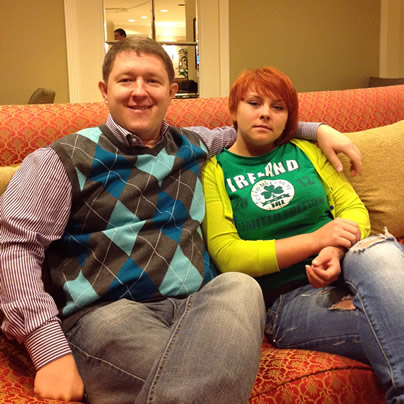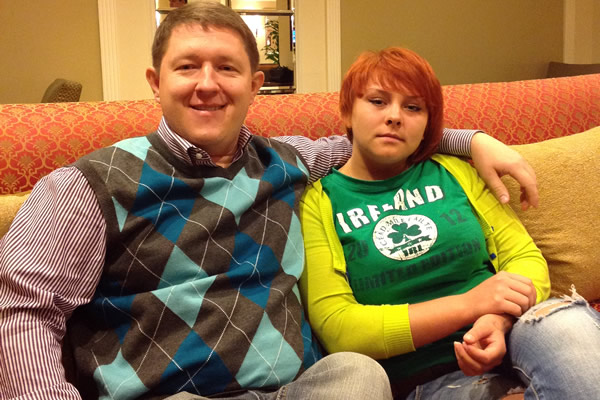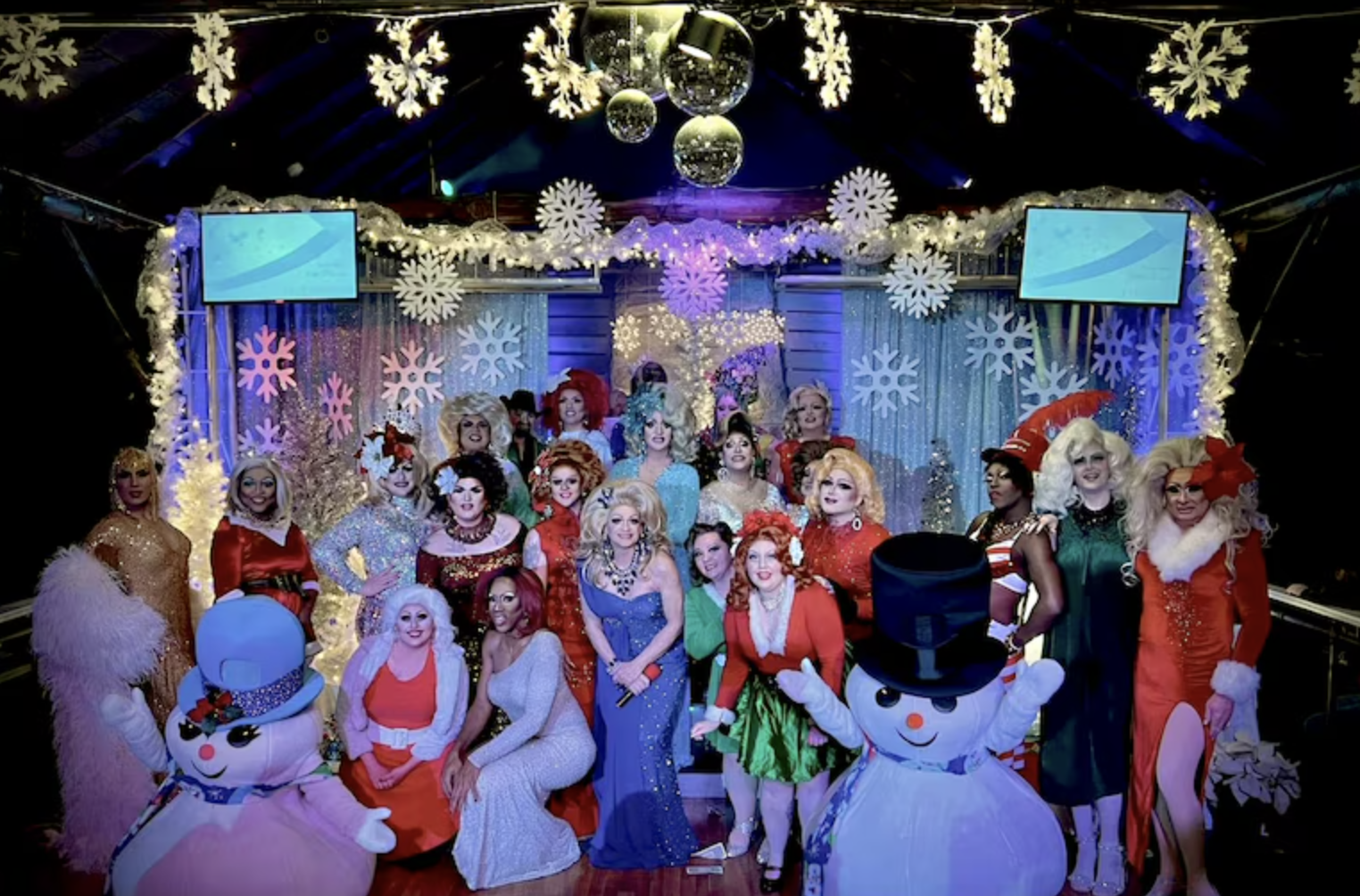News
Russian LGBT rights advocates visit D.C., Maine
Urge end to country’s anti-gay crackdown


Oleg Klyuenkov and Lyudmila Romodina of the Russian LGBT advocacy group Rakurs in D.C. on Nov. 8, 2013. (Washington Blade photo by Michael K. Lavers)
Two Russian LGBT rights advocates last week urged U.S. officials to continue to pressure the Kremlin to end its anti-gay crackdown.
Lyudmila Romodina and Oleg Klyuenkov of Rakurs (“Perspective” in Russian) in the city of Arkhangelsk met with U.S. Sen. Patty Murray (D-Wash.) and officials with the U.S. State Department, the White House and the Helsinki Commission in D.C. on Nov. 7. They also discussed Russia’s gay rights record Congressional LGBT Equality Caucus staffers on Capitol Hill on Nov. 8.
Romodina and Klyuenkov arrived in the U.S. on Nov. 1 — the same day the Olympic torch passed through Arkhangelsk on its way to the 2014 Winter Olympics that will take place in Sochi, Russia, in February.
Their trip began in Portland, Maine, where they met with the city’s mayor, Michael Brennan, members of a local PFLAG chapter, Equality Maine and other LGBT rights advocates and officials. The activists’ visit coincided with the 25th anniversary of the sister city partnership between Portland and Arkhangelsk.
Romodina and Klyuenkov returned to Russia on Nov. 10.
Human Rights First, a group that promotes international human rights, organized Romodina and Klyuenkov’s trip to the U.S.
“We’re trying to use [Russian] American partnerships in a constructive way; to take the partnership to a new level of dialogue where human rights and LGBT rights are present at the table, they’re discussed,” Innokenty Grekov of Human Rights First told the Washington Blade during an interview in Northwest Washington on Nov. 8.
Arkhangelsk law was ‘test pilot’ for national gay propaganda ban
Rakurs, which is a member of the Russian LGBT Network, is the first group that specifically works with Arkhangelsk’s LGBT residents.
The group was a feminist organization when it was founded in 2007. Russia’s Justice Ministry in 2010 denied Rakurs’ request to add the words lesbian, gay, bisexual and transgender to their charter and by-laws.
A regional court later ordered the Justice Ministry to allow Rakurs to register as an LGBT rights organization.
“It took some time,” Klyuenkov told the Blade through an interpreter.
Arkhangelsk officials in 2011 banned propaganda that promotes homosexuality and bisexuality. They quietly repealed the law last month, but Klyuenkov told the Blade the Arkhangelsk statute was a “test pilot” for the nationwide ban on gay propaganda to minors that Russian President Vladimir Putin signed in June.
“The informational campaign that surrounded the regional ban in Arkhangelsk was a miniature version of the mass media campaign that surrounded the adoption of the federal ban,” Klyuenkov said. “It was quite aggressive as we were just slandered and slimed. We were accused of undermining demography of Russia, undermining traditional values, being a threat to traditional values.”
Rakurs distributed leaflets that contained information on what Klyuenkov described as the “dangers of adopting a federal law on propaganda.” The organization also sought a permit to stage a protest against the measure as members of the Russian Duma debated it, but Romodina told the Blade that Arkhangelsk officials used the regional gay propaganda ban to deny their request.
“When we received these denials for demonstrations involving multiple individuals, we went and nevertheless demonstrated in single pickets,” she said.
Lawmakers criticize IOC during advocates’ trip
Romodina and Klyuenkov’s trip to the U.S. coincided with the growing outrage over the Kremlin’s LGBT rights record that threatens to overshadow the Sochi games.
U.S. Sens. Barbara Boxer (D-Calif.), Christopher Murphy (D-Conn.), Jeff Merkley (D-Ore.), Dick Durbin (D-Ill.), Jeanne Shaheen (D-N.H.), Sheldon Whitehouse (D-R.I.), Claire McCaskill (D-Mo.), Al Franken (D-Minn.), Elizabeth Warren (D-Mass.), Christopher Coons (D-Del.) and Mark Udall (D-Colo.) in a Nov. 8 letter criticized International Olympic Committee President Thomas Bach over his previous comments that appeared to suggest he feels Russia’s gay propaganda ban does not violate the Olympic Charter.
Bach said in September before the lighting of the Olympic torch in Greece that Olympic values include “respect without any form of discrimination.” Putin on Oct. 28 reiterated previous Russian government claims that gays and lesbians will not suffer discrimination during the Sochi games.
“Although some Russian authorities have indicated that the law will not affect Olympic spectators and participants, we have yet to see a satisfactory explanation of what type of activities or behavior will be permitted,” the U.S. senators wrote in their letter. “If LGBT individuals or supporters were to be arrested or harassed during the Olympics, the reputation of the IOC would be damaged.”
U.S. Rep. Ileana Ros-Lehtinen (R-Fla.) and more than three dozen other members of Congress last month urged U.S. Olympic Committee President Scott Blackmun to outline steps the USOC plans to take to safeguard American athletes who plan to compete in Sochi.
Blackmun on Oct. 11 described Russia’s gay propaganda ban is “inconsistent with the fundamental principles of the Olympic and Paraolympic movements.” The U.S. Olympic Committee Board of Directors the day before voted to add sexual orientation to its non-discrimination policy.
Advocates oppose Olympic boycott
Romodina and Klyuenkov are the latest Russian LGBT rights advocates to visit the U.S.
Igor Kochetkov of the Russian LGBT rights group Sphere is among those who met with Ros-Lehtinen on Capitol Hill in September. He was part of the group of human rights activists who met with President Obama during the G-20 summit in St. Petersburg a few weeks earlier.
Russian LGBT Sports Federation Co-President Elvina Yuvakaeva was part of a five-member delegation whom the State Department invited to the U.S. in September to meet with professional American sports team and organizers of the 1996 Summer Olympics in Atlanta and the 2002 Winter Olympics in Salt Lake City.
Klyuenkov told the Blade he feels “interest groups” within the Russian government have “persuaded” Putin to sign the gay propaganda law and other anti-LGBT measures. These include a 2012 statute that requires groups that receive funding from outside the country to register as “foreign agents.”
“This federal law on propaganda is part of a larger, broader policy,” Klyuenkov said. “The government is simply trying to distract the public’s attention from our societal problems, our economic problems.”
Klyuenkov and Rodomina both stressed their organization remains opposed to any boycott of the Sochi games over Russia’s LGBT rights record.
“We should use both the Olympic games and the existing relationships between our municipal entities as a platform for discussing human rights, for encouraging more dialogue within Russia between the government and civil society and LGBT groups,” Klyuenkov said.
The advocates spoke with the Blade a day before gay MSNBC anchor Thomas Roberts co-hosted the Miss Universe pageant in Moscow.
Roberts repeatedly criticized the gay propaganda law during interviews with the “Today” show and other media outlets in the days leading up to the pageant that Donald Trump co-owns with NBC Universal. Pageant participants did not discuss Russia’s LGBT rights record during the event.
“It’s great,” Klyuenkov told the Blade when asked about Roberts co-hosting the pageant. “I don’t think the Russian people watch Miss Universe.”
Elton John is scheduled to perform two concerts in Russia next month amid controversy from some LGBT rights advocates.
“His approach is to go over and engage and win over,” Grekov told the Blade. “Rakurs is doing the same. Human Rights First is so happy to help facilitate this visit and raise their voice.”
United Nations
UN Human Rights Council extends LGBTQ rights expert’s mandate
29 countries voted for resolution

The U.N. Human Rights Council on Monday extended the mandate of the United Nations’ independent LGBTQ rights expert for another three years.
The resolution passed with 29 countries (Albania, Belgium, Bolivia, Brazil, Bulgaria, Chile, Colombia, Costa Rica, Cuba, Cyprus, the Czech Republic, the Dominican Republic, France, Georgia, Germany, Iceland, Japan, Kenya, the Marshall Islands, Mexico, the Netherlands, North Macedonia, South Korea, Romania, South Africa, Spain, Switzerland, Thailand, and Vietnam) voting for it and 15 countries (Algeria, Bangladesh, Burundi, China, Cote d’Ivoire, Democratic Republic of Congo, Ethiopia, Gambia, Indonesia, Kuwait, Malawi, Maldives, Morocco, Qatar, and Sudan) voted against it.
Benin, Ghana, and Kyrgyzstan abstained.
The U.S. in February withdrew from the Human Rights Council. The Trump-Pence administration in 2018 pulled the U.S. from it. The U.S. in 2021 regained a seat on the Human Rights Council.
Graeme Reid has been the UN’s independent LGBTQ rights expert since 2023. The South African activist, among other things, previously ran Human Rights Watch’s LGBT Rights Program.
Maryland
Maryland’s oldest rural gay bar — and one of the last — is a log cabin in the woods
The Lodge is a Boonsboro watering hole resembling a log cabin

By SAPNA BANSIL | In the woods of a conservative Western Maryland town of fewer than 4,000 people is an unlikely landmark of state LGBTQ history.
The Lodge, a Boonsboro watering hole that resembles a log cabin, is Maryland’s oldest rural gay bar — one of a few remaining in the country, according to historians.
For about four decades, the Washington County venue has offered safety, escape and community to queer people far from large, liberal cities. Starting Friday night, The Lodge will close out Pride month with one of its biggest parties of the year: a weekend of dancing, drinking and drag in celebration of Frederick Pride, held about 20 miles away in the area’s largest city.
The rest of this article the Baltimore Banner published on June 27 can be read on its website.

South Africa National Assembly Speaker Thoko Didiza on June 17 swore in lesbian feminist Palomino Jama as a new MP.
Jama joins other LGBTQ legislators — including Public Works and Infrastructure Minister Dean Macpherson; Forestry, Fisheries and the Environment Minister Dion George; and Deputy Women, Youth, and Persons with Disabilities Minister, Steve Letsike.
Jama said she will work hard and excel as MP.
“What a great moment to be alive. Thank you youth of 1976, thank you Simon Nkoli, Phumi Mthetwa, Paddy Nhlaphos, Vanessa Ludwig, and others for what you did for the LGBTI people in the 80s and 90s. Lastly, for the fierce fist of the Jamas to always hit where it matters for the people of this country,” said Letsike.
Embrace Diversity Movement, a local LGBTQ organization, said Jama’s inauguration came at an appropriate time, during Pride month.
“Her swearing-in took place during a month of profound significance in June, which marks both international Pride Month and Youth Month in South Africa,” said the group. “Palomino is a seasoned queer activist and dedicated community builder with a distinguished record of leadership and service.”
“The EDM proudly supports Palomino in her deployment to parliament, her presence meaningfully advances youth and queer representation in public office,” added the Embrace Diversity Movement. “We are confident that she will serve the people of South Africa with integrity, courage, and distinction.”
South Africa is the only African country that constitutionally upholds LGBTQ rights. There are, however, still myriad challenges the LGBTQ community faces on a daily basis that range from physical attacks to online abuse.
Letsike in May faced a barrage of online attacks after she released a scathing statement against popular podcaster Macgyver “MacG” Mukwevho, who during a podcast episode in April insinuated that the reason behind popular socialite Minnie Dlamini’s “unsuccessful” relationships were probably due to the bad odor from her genitals.
Letsike, who viewed MacG’s comments as offensive, called for the podcaster to be summoned before parliament’s Portfolio Committee on Women, Youth, and Persons with Disabilities and criticized the local television station that aired the podcast.
X users and other social media subscribers bombarded Letsike with anti-lesbian comments. She, however, was unphased.
Letsike continues to face anti-lesbian comments, even though MacG apologized and the television station on which his podcast had aired cancelled its contract with him.




















